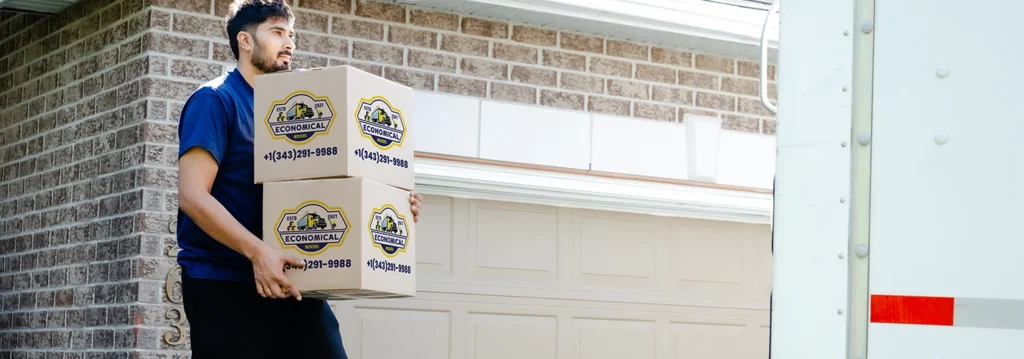It can be frustrating to unpack your belongings after a move, only to find that you’ve lost some of your important documents. Even worse, you discover that your possessions were damaged in some way during the trip.
Unfortunately, transportation is fraught with inherent risks, such as accidents and unforeseen events. Industry data show that nearly 30% of moving insurance claims involve damage to items, highlighting just how unpredictable even a routine relocation can be. Therefore, many people, before planning their move, search for “insured movers near me” to ensure their belongings are protected.

At Economical Movers, we’ve been helping people move since 2021 and have handled over 600 moves along the way. One thing we’ve learned is that moving insurance matters.
In this blog, we’ll break down what it’s all about and walk you through the options so you can choose what works best for you.
What Is Moving Insurance?
Moving insurance is a specific insurance that covers your items throughout a relocation. Although most basic home insurance policies cover some elements of your household objects, they usually do not cover goods in transit. Moving insurance comes in handy here. This insurance typically covers any loss or damage to your goods during transportation. This guarantees that, in the event of an accident, you are not left to bear the entire financial burden.
Why Do You Need Moving Insurance?
Even with the best insured movers, there is a chance of your belongings getting damaged during the moving process. That’s why many people start by asking, “Do moving companies have insurance? However, not all coverage is created equal.
Though your coverage will vary depending on the provider, you may be covered for the following:
- Loss or damage occurred during the packing and unpacking of the goods
- Loss or damage when loading or unloading
- Loss or damage while in transit
- Loss or damage due to mishandling
- Incidental storage costs
What Are The Different Types of Moving Insurance?
You have multiple moving insurance options available. You must choose the one that most suits your requirements. Let’s find out the options:

1. Released Value Protection
The most basic coverage available from moving firms is released value protection. Moving firms will not charge you for released value protection, but the customer still has to ask for and legally agree to the policy.
Although it costs nothing extra, released value protection offers limited protection. It will prevent lost and damaged objects from being replaced or rebuilt if a claim is made.
2. Full Value Protection
Full value protection is another way you could guard your possessions. This coverage is significantly more extensive than released value protection; you must pay an upfront charge. This usually ranges from 1% to 2%. Many full-value protection insurance policies also have deductibles.
Choosing full value protection means your moving company is accountable for the full replacement value of the things they are handling, with some restrictions. As the customer, you will pay a fee for that level of coverage after declaring what you believe your items are worth per pound. Most moving firms will have some kind of minimum value you have to claim on your possessions; most also have their own full value protection coverage.
With Full Value Protection, your moving company may handle a claim in one of three ways:
- Repair the damaged item
- Replace the item with one that has a comparable value
- Offer a payout for the cost of repair, keeping in mind the current market value
Most moving firms will let you buy extra protection for these valuable objects. Your premium or deductible will be higher the more valuable things you own.
Most moving firms will provide the chance to buy extra protection for these valuable goods. Your premium or deductible will be higher the more valuable things you own.
3. Third party Moving Insurance
Third party insurance lets you buy protection from an unbiased insurance company. These plans can cover more ground than what relocation companies supply. If you are relocating great distances or if you have valuable stuff, it is usually advised.
Step-by-Step Process of How Moving Insurance Works
Are you having trouble choosing the right moving insurance? Don’t worry, below we have discussed the process to select the best moving insurance tailored to your needs.
Step 1: Evaluate Your Belongings
Make a thorough inventory list of all your belongings. Note the total value of each item you plan to move. Take clear photos of these belongings for the documentation process.
Step 2: Pick The Right Insurance
Choose the right moving insurance among the various types mentioned above. Additionally, you can consider a custom policy based on your needs.
Step 3: Understand the Terms
Read the policy terms in detail. Pay special attention to coverage limits, additional costs, and exclusions. You may also ask for clarification from the insurer if you have any doubts.
Step 4: Purchase and Confirm
Finalize your insurance choice. Ensure everything is correctly documented in your moving contract. For your records, keep copies of all the paperwork.
Step 5: Move Day
Ensure all things on your inventory list are accounted for before and after the move.
Step 6: If Damage or Loss Occurs
Inform the moving company right away. Take pictures of the damage and write down information about what happened.
Step 7: File a Claim
Submit a claim to your insurance provider and add all the relevant documentation. You may have to follow up regularly to ensure that your claims are processed on time.

Top Benefits of Getting Moving Insurance For Your Next Relocation
Moving is already a lot to deal with. Boxes, schedules, long checklists. The last thing you want is to deal with damage or loss—and that’s where insurance quietly saves the day.
1. Compensation for Damaged or Lost Items
If something breaks or just disappears during the move, you won’t be left covering the cost out of pocket. That alone makes it worth considering.
2. Move With Complete Peace of Mind
It’s easier to stay calm when you know your stuff is protected. You don’t have to hover over every item or panic with every bump.
3. Eliminate Risk During Transit
Let’s be honest, no one can control how the road treats your belongings. Insurance steps in when the unexpected shows up.
4. Shows The Credibility of The Moving Company
If a moving company openly talks about insurance, it usually means they take their job seriously and care about your things.
5. Builds Confidence In The Entire Moving Process
Knowing you’re covered just makes everything smoother. You’re not second-guessing every step, and it’s easier to trust the people helping you move.
Final Words
You should give some thought to whether relocation insurance is really helpful. After exploring the nuances of coverage choices and claims procedures, the solution ultimately depends on your particular situation. Moving insurance does offer financial protection in case of damage or loss, which can be a huge relief during such a chaotic process. Whether it’s worth it will depend on factors like the value of your belongings, the distance you’re moving, and the kind of coverage the company provides.
At Economical Movers, we provide comprehensive moving coverage, allowing you to relocate your property with added peace of mind. Contact us today to discover the insurance options available for your upcoming move.



